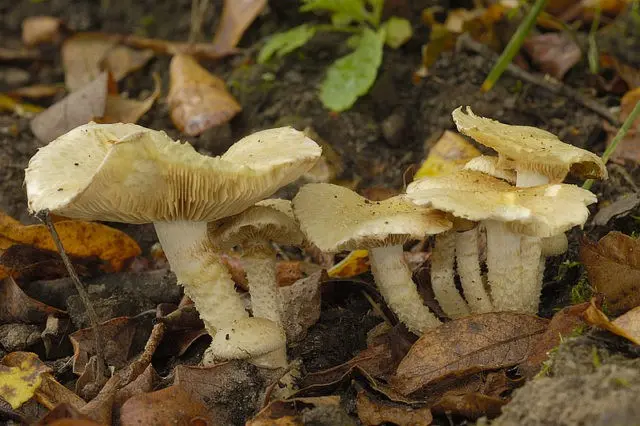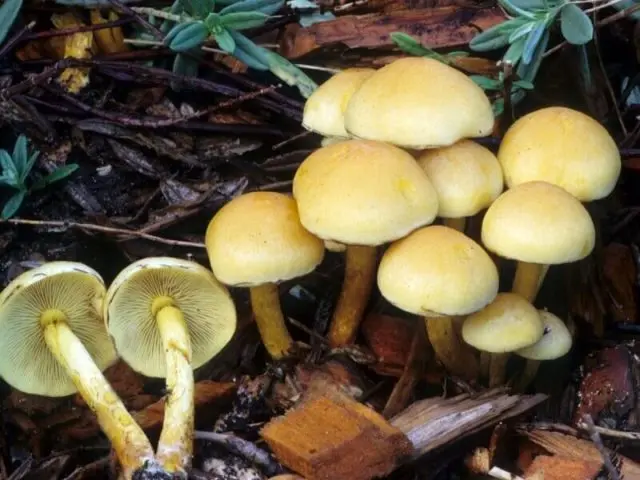Contents
Clay-yellow sticky flake, or late moth, is a very tasty but rare agaric fungus that delights connoisseurs in late autumn. Few people collect it, except perhaps true gourmets who understand the high taste qualities of this delicacy. It is worth saying that the Japanese and Chinese cultivate flake, setting aside entire plantations for its cultivation.
What does sticky flake look like
This lamellar small mushroom of a yellow, clay shade got its name for the sticky, mucus-covered surface of the body. The sticky flake is distinguished by its unsightly appearance, and therefore does not attract the attention of domestic mushroom pickers, although it is actually very tasty.
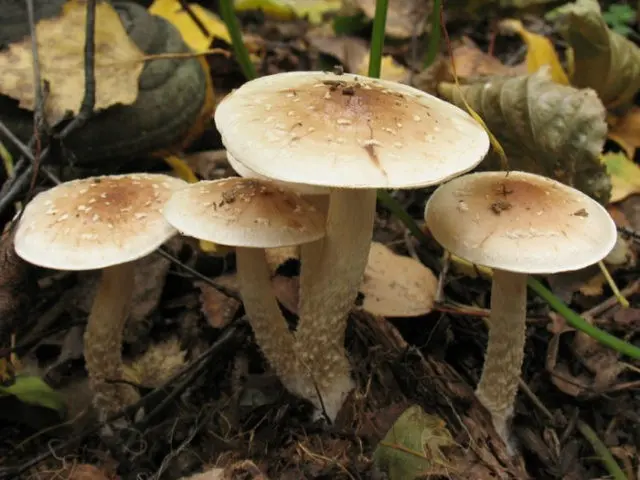
Cap Description
The hemispherical, convex and very small cap of the sticky flake at a young age has a light – white or with a yellowish tinge – color. Over time, its size increases and averages 6 cm in diameter, and the color becomes clay yellow. A dark tubercle adorns the central part of the cap, covered with mucus, not only in high humidity, but also in dry weather. Tightly appressed, flaky scales are highly visible in juveniles. The plates in the inner surface serve for the formation of spores and further reproduction. Young mushrooms have a light color of the plates, the old ones are dark, light brown.
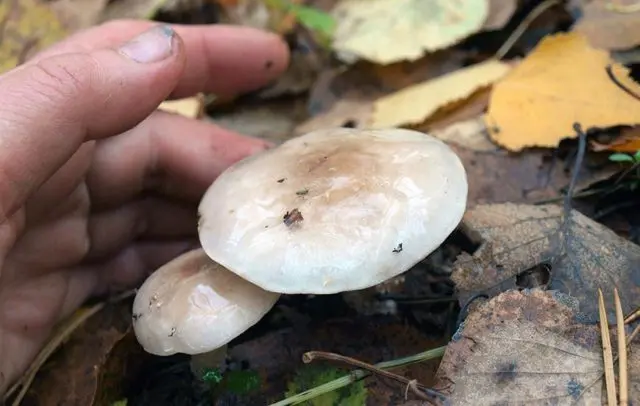
Description of the leg
The sticky flake has an erect, and in some cases a slightly curved, cylinder-shaped stalk without an internal cavity. Its height is 5-8 cm. Young specimens have the remains of flocculent spores in the form of a ring on the stem, which visually divide it into two parts. The color and texture of the legs differ in different places: on top it is creamy, light with a smooth surface, and on the bottom it is thickened, covered with scales of a dark brown, rusty hue. Old mushrooms do not have rings, but the heterogeneity of the stem is preserved.
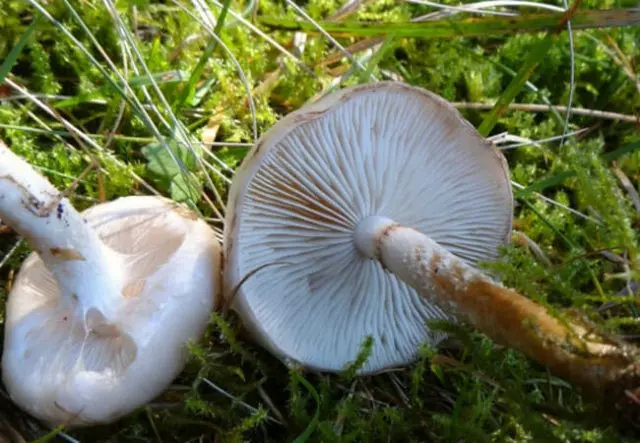
Edible sticky flake or not
Glutinous flake refers to conditionally edible varieties of mushrooms that can be used after preliminary heat treatment for the preparation of tasty and healthy dishes. In some regions, it is classified as a mushroom of the fourth category.
How to cook sticky flake
Glutinous flake is a very tasty mushroom, which, when cooked according to the above recipes, fully reveals its taste qualities. Before any method of preparation, it is boiled for 15 – 20 minutes.
The legs are previously separated from the cap – they are not used for food. To remove the mucus, it is enough to rinse the mushrooms well under running cold water. Second courses are prepared from it, salted and marinated according to classic recipes.
How to pickle a late moth
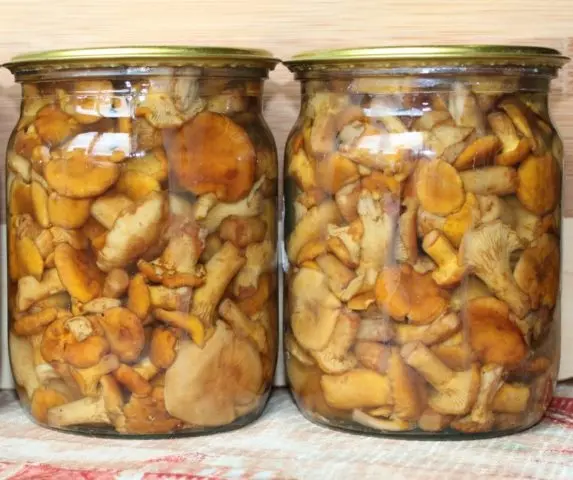
To pickle 4 kg of fresh mushrooms brought from the forest, you will need:
- 2 L of water;
- 2 Art. l salts;
- 1,5 st. l. granulated sugar and the same amount of 9% vinegar;
- cloves and black peppercorns – to taste.
Cooking algorithm.
- Prepared mushrooms are sorted by size, washed well and boiled for 50 minutes.
- The broth is drained and boiling is repeated in fresh water for 15 minutes.
- To drain the water completely, the flake is thrown into a colander.
- Mushrooms and spices are placed in sterilized jars.
- Boil the marinade with the addition of sugar, salt and vinegar.
- Banks are filled with broth, rolled up.
How to pickle clay yellow flakes
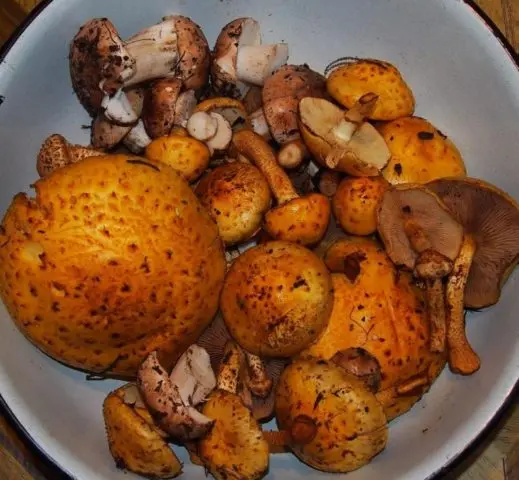
For salting you will need:
- sticky moth – 2 kg;
- salt – 100 g;
- spices – peppercorns, cloves, bay leaf.
Algorithm cooking:
- Thoroughly washed mushrooms are boiled for 20 minutes. with spices.
- Throw in a colander and place in a prepared container.
- Sprinkle with salt, dill umbrellas, currant leaves.
- Cover with cotton cloth and press down with a load.
- For storage, the finished product is cleaned in a cool, dark place, closing the dishes with a lid.
Where and how to grow
The sticky flake grows in the northern hemisphere of temperate climatic zones: in Western and Eastern Europe, Canada, North America. In Our Country, it grows almost everywhere: in the central regions, in Siberia, in the Urals and the Far East, in Karelia. This mushroom culture prefers coniferous forests with a lot of spruce forests. Sticky scales can also be found in shrubs and moss, on rotten wood residues immersed in the soil, and also where small chips and branches are scattered. The fungus grows in small, several specimens, groups. It enters the stage of active growth at the very end of summer or at the beginning of the first month of autumn, its vegetation period continues until the onset of cold weather.
Twins and their differences
There are few twins in the late sticky moth. You can confuse it with other representatives:
- gum flake.

- false honeysuckles.

The gum-bearing flake has a beige cap. It is eaten in the same way as late moth: pickled, salted or fried.
False mushrooms are distinguished by beige, yellow and brownish, more rounded hats than the original, and elongated legs. Mucus on their surface appears only in rainy weather, while sticky flakes are always covered with it. False honey agaric is an inedible, poisonous mushroom.
Conclusion
The sticky flake differs from its relatives in a very wet, with mucus, hat, therefore, upon close examination, it is impossible to confuse it with twins. In its composition, it has many vitamins and amino acids, which bring invaluable benefits to the human body. The presence of such a valuable product in the diet can significantly improve health and increase vitality.










